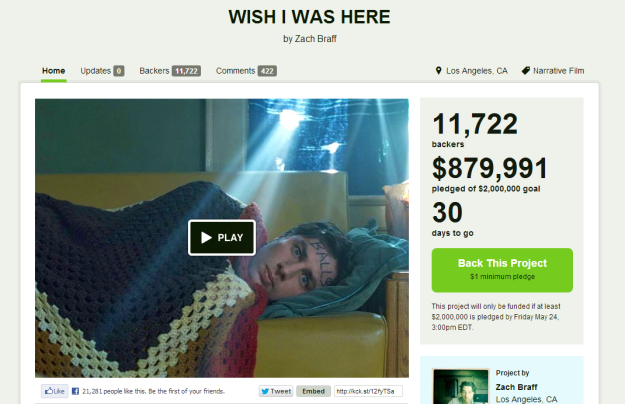 Kickstarter is far from a perfect platform. Backing a project comes with a variety of risks, risks that have been widely discussed and publicized; at this point it’s safe to say that anyone who loses money (or pride, or dignity) by backing a faulty or doomed Kickstarter project has been warned. And then some.
Kickstarter is far from a perfect platform. Backing a project comes with a variety of risks, risks that have been widely discussed and publicized; at this point it’s safe to say that anyone who loses money (or pride, or dignity) by backing a faulty or doomed Kickstarter project has been warned. And then some.
The other gray, confusing, and contentious area of Kickstarter has more to do with those behind the projects than those backing them. While there are plenty of idea men and women out there using the platform to … kick start (it’s just the best way to say it) their products and concepts, there is another breed of Kickstarter: The celebrity.
Zach Braff is the latest famous Kickstarter user. He’s pitching an indie film called Wish I Was Here. Braff explains why he decided to head the crowdfunding route rather than the typical Hollywood production path.
“I was about to sign a typical financing deal in order to get the money to make [this movie]. It would have involved making a lot of sacrifices I think have ultimately hurt the film,” he says. “I’ve been a backer for several projects on Kickstarter, and thought the concept was fascinating and revolutionary for artists and innovators of all kinds. But I didn’t imagine it could work on larger-scale project. I was wrong.”
He references the “incredible” success of the Veronica Mars Kickstarter campaign, saying that this method means creators can retain control over smaller, personal films. So far, backers have contributed nearly $880,000 to Braff’s project (which is asking for a cool $2 million – you can see its progression in the widget above). Perks range from early access to the Wish I Was Here soundtrack and production diary all the way up to the chance to be a cast member.
Whoa, hold up, what’s that now? Yes, that’s right, if you’re willing to pony up a whopping $10,000, you can be a cast member in the film. “For one of my biggest supports, here’s one of the biggest rewards. You will be credited as a cast member of Wish I Was Here,” the campaign explains. “Visit us on set and if you want, I’ll put you in a scene we are shooting and write a line just for you. And, we’ll give you the star treatment. Hair, makeup, wardrobe, and a space to practice your line.”
It’s a strange dichotomy: Braff is turning to Kickstarter so he can retain more control over this film, yet he’s willing to sacrifice certain elements in order to crowd-finance it. For $7,000, one lucky backer will be able to name a character, for $2,500, you could be an extra.
Of course, the Veronica Mars project has similar perks: For $2,500, you can be a featured background extra; for $6,500, you can name a character. $10,000, and you get a speaking role.
So that’s hypothetical problem with this number one: Either way, you’re selling out to make your movie. You can do it through traditional financing models, or you can do it by auctioning off bits and pieces of it to … well, anyone.
Then there’s the fact that people who turn to funding their movies on Kickstarter get to retain more of the money. If you don’t use actual producers and investors – which, surprise, are expensive – when you sell the distribution rights to a film, you have fewer (maybe zero) people to pay back. Instead, you sold off bit parts and t-shirts.
The last issue is either of little or paramount importance to you: When big names and already-successful producers take to Kickstarter to fund their projects, it devalues the purpose of the platform and draws attention to those who don’t actually need it. Sure, if the majority speaks and donates, then clearly this concept was meant to be made … but people like Zach Braff and Rob Thomas (the writer, not the lead singer of Matchbox Twenty) don’t need the help or the spotlight – they just want it.


